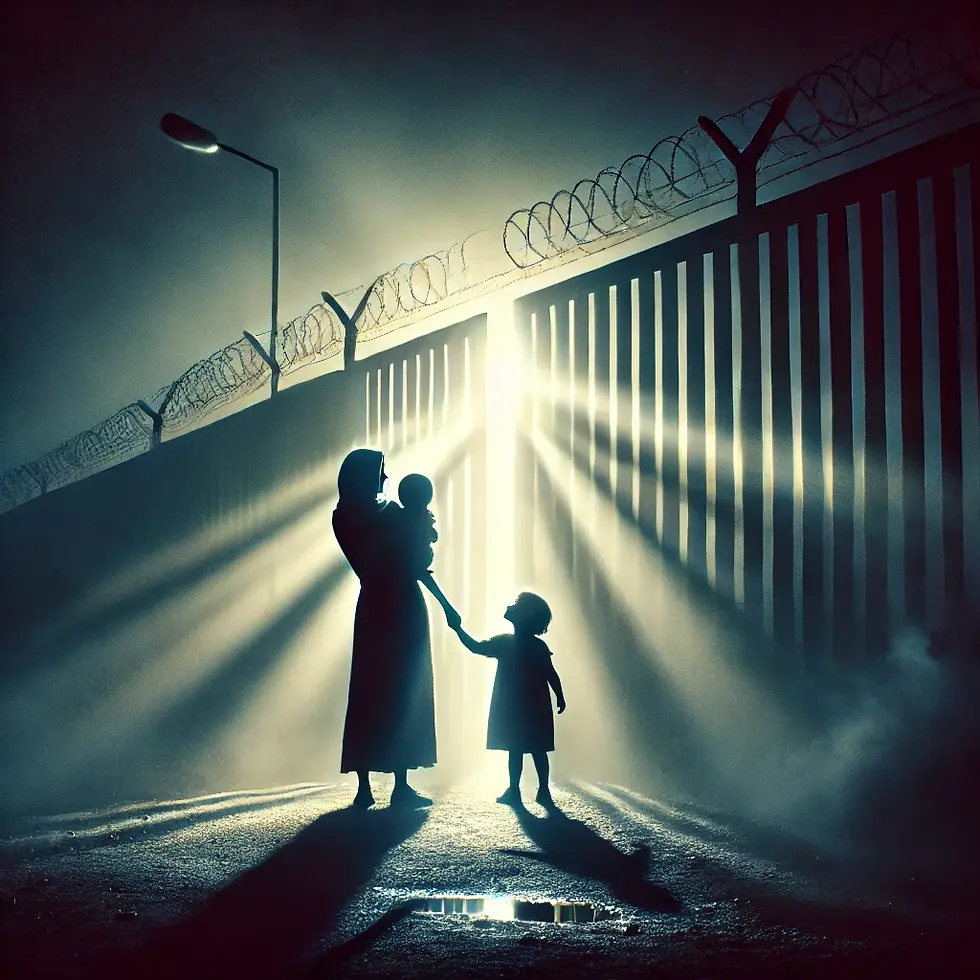
The Price of Being Human: Who Decides Who Deserves Rights?
- A HumanKind

- Mar 7
- 4 min read
Who Gets to Have Human Rights? The Answer Should Be ‘Everyone’—But It’s Not.
Human rights aren’t a privilege. They’re a promise. And every time we decide some people don’t deserve them, we break that promise—and a little bit of our own humanity along with it.
They Told Aisha to Be Silent.
When the soldiers came, Aisha hid. She listened as her world collapsed outside her door—the shouts, the gunfire, the desperate cries of people she loved.
She ran. Barefoot, breathless, carrying nothing but the name her mother gave her.
When she reached the border, they told her she was illegal. When she begged for asylum, they called her a burden. When she spoke about what had happened, they called her a liar.
Aisha isn’t a criminal. She isn’t a number on a government report. She’s a person. But the world treats her life like a technicality.
And she’s not the only one.
We love to say that human rights are universal. That they belong to everyone, equally. But if that were true, why do so many people have to fight for them?
The Myth of ‘Universal’ Human Rights
The Universal Declaration of Human Rights (UDHR), written in 1948, is supposed to guarantee dignity, freedom, and protection for everyone. It was a beautiful idea. A promise to never let history repeat itself.
But what is a promise worth if it’s only kept for some?
Look around.
Some people can move freely across borders. Others drown in the sea trying.
Some get justice. Others are silenced.
Some live in safety. Others are punished just for existing.
The truth is, human rights are not universal in practice. They’re handed out selectively, like a VIP pass to dignity. Your nationality, skin color, gender, or bank account balance shouldn’t determine whether you get to live in freedom or fear—but it does.
The Loophole That Costs Lives: ‘Conditional’ Rights
Governments and institutions love to talk about human rights—until upholding them becomes inconvenient.
They condemn war crimes—unless they’re committed by an ally.
They offer asylum—but only if it’s politically beneficial.
They stand for freedom—but jail people who challenge their own power.
For refugees, LGBTQ+ people, political activists, and entire ethnic communities, rights aren’t universal—they’re conditional. And those conditions can change overnight.
Who Decides Who Deserves Dignity?
Let’s get specific. Who’s being left behind?
Refugees and Asylum Seekers – Fleeing war, persecution, and violence, only to be treated like criminals. For instance, Thailand recently deported Uyghur refugees back to China, despite warnings they’d face torture.
LGBTQ+ Communities – In many places, loving the “wrong” person is still illegal. Being trans is still a crime. Entire lives are erased, and governments look the other way. The Yogyakarta Principles outline what true equality should look like, but many countries refuse to recognize them.
Women and Girls – They’re still fighting for basic rights over their own bodies, their futures, and their safety. A recent UN report reveals that women’s rights are under attack 30 years after leaders adopted a blueprint for equality.
Religious and Ethnic Minorities – Whether it’s Uyghurs in China, Rohingya in Myanmar, or countless others, entire groups are being silenced and persecuted simply for existing in the “wrong” place.
Political Activists and Journalists – Jailed, tortured, or killed for speaking inconvenient truths. The UN recently warned about increasing threats to journalists worldwide.
This System Was Built to Protect Power—Not People
If human rights only apply when it’s easy, they’re not rights—they’re privileges.
The failure of human rights isn’t just a mistake in the system. It is the system.
Borders exist to keep some people out and let others in.
Laws are written to protect power, not justice.
Governments promise to stand up for human rights—until the cost is too high.
This isn’t about lack of resources. It’s about who is seen as worthy of protection, and who is not.
Aisha’s Story is Not Just Hers
Aisha ran because she had no choice. She crossed a border because staying meant death. She asked for protection because human rights are supposed to apply to everyone.
Instead, she was told she didn’t belong.
Somewhere, in another country, someone else—born in the right place, with the right passport—was welcomed with open arms. Given safety. Given a future.
Not because they were more human than Aisha.
Not because they deserved it more.
But because someone in power decided that their life counted—and hers didn’t.
And that should make every single one of us angry.
Because this isn’t just about Aisha.
It’s about every person who has ever had to beg for the rights they were already promised. It’s about all of us. Because if rights can be granted, they can also be taken away.
The question isn’t whether we should fight for human rights.
The question is: Who do we become if we don’t?
Sources and more
Thailand condemned for 'shameful' mass deportation of Uyghur refugees to China
Women's rights are under attack 30 years after leaders adopted a blueprint for equality, UN says
China tops list of countries trying to silence exiled dissidents
UN human rights chief warns of fundamental shifts threatening freedoms



Comments